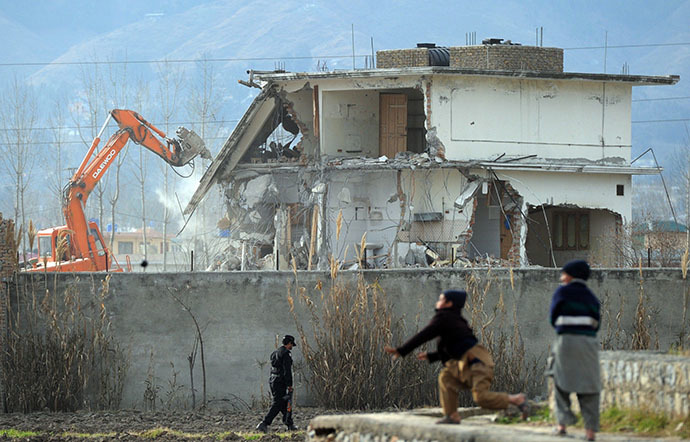Military files detailing the Navy SEAL raid which killed Osama bin Laden in 2011 were removed from Defense Department computers and sent to the CIA, in an effort to make the documents harder for the general public to access.
The secret move, ordered by Adm. William McRaven, was mentioned
in a draft report by the Pentagon's inspector general, which was
acquired by AP.
McRaven, who oversaw the bin Laden raid, expressed his concerns
in the report about possible disclosure of the identities of the
SEALs. He ordered that names and photographs associated with
Operation Neptune Spear not be released.
"This effort included purging the combatant command's systems
of all records related to the operation and providing these
records to another government agency," the draft report said.

But that sentence was removed from the final version of the
document, which was released several weeks ago. Unnamed current
and former Defense Department officials confirmed to AP that
"another government agency" mentioned in the report was code for
the CIA.
McRaven’s spokesman declined to comment on the issue when he was
approached by AP. Meanwhile, the CIA explained that the SEALs
involved in the bin Laden raid were effectively assigned to work
temporarily for the CIA, which has presidential authority to
conduct covert operations.
"Documents related to the raid were handled in a manner
consistent with the fact that the operation was conducted under
the direction of the CIA director (Leon Panetta)," agency
spokesman Preston Golson said in an emailed statement.
"Records of a CIA operation such as the (bin Laden) raid,
which were created during the conduct of the operation by persons
acting under the authority of the CIA Director, are CIA
records,” he added.
Golson said that it is "absolutely false" that records
were moved to the CIA to avoid the legal requirements of the
Freedom of Information Act.
Under US federal rules, transferring government records from one executive agency to another must be approved in writing by the National Archives and Records Administration. But according to AP, the respective authorities weren’t notified that the bin Laden raid files were being moved.

The Pentagon told AP that it couldn't find any documents on bin
Laden’s killing inside the Defense Department. The response came
after the news agency requested to see the documents in 20
separate applications – most of which were submitted in May 2011.
The CIA has special authority to prevent the release of
"operational files" in ways that can't effectively be challenged
in federal court, while a judge has the power compel the Pentagon
to turn over non-sensitive portions of their military records.
AP expressed concern that the relocation of Operation Neptune
Spear files “could represent a new strategy for the US
government to shield even its most sensitive activities from
public scrutiny.”
This means the only official accounts on the mission, which saw
al-Qaeda leader Osama bin Laden killed in his Pakistani hideout
on May 2, 2011, come from US officials - who provided conflicting
versions of events.
In the days following the operation, the White House falsely
claimed that bin Laden was armed and firing at the SEALs,
misidentified which of bin Laden's sons was killed, and
incorrectly stated that bin Laden's wife died in the shootout.
Obama's press secretary attributed the large number of errors to
the "fog of combat."
Two participants of the bin Laden raid have come out to the
public since the operation. One of the SEALs published a book
about the raid under a pseudonym, but was later identified by his
actual name.
Earlier this year, the SEAL credited with shooting bin Laden gave
Esquire magazine an anonymous interview about the mission. He
also disclosed the details and challenges of retiring from the
military without a pension after 16 years of service.
Report reveals Pakistan failures on bin Laden
A leaked Pakistani government report scolds military and civilian
officials for failing to realize bin Laden was hiding in the
country in the years before a US military team killed the Al
Qaeda leader. The 337-page Abbottabad Commission report said bin
Laden’s nine years in Pakistan was proof of “culpable
negligence and incompetence” and “collective failures”
throughout the government.
The report, published by Al Jazeera and a rare
instance of Pakistani officials publicly criticizing government
and military higher-ups, also took aim at the nation’s lagging
intelligence capabilities that allowed US troops to conduct a
secret three-hour mission “deep inside Pakistan.” It also
called on the country’s leadership to apologize to the Pakistani
people for “their dereliction of duty.”

